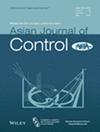New delay-dependent finite-time stabilization of Takagi–Sugeno fuzzy approaches for delayed nonlinear systems
IF 2.7
4区 计算机科学
Q2 AUTOMATION & CONTROL SYSTEMS
引用次数: 0
Abstract
In this paper, the finite-time stability and stabilization of nonlinear systems with delays is studied, via a Takagi–Sugeno approach. By using a novel Lyapunov–Krasovskii functional and introducing some fuzzy free-weighting matrices, sufficient conditions are derived, for bounded and differentiable time-varying delays in terms of an upper bound of the delay derivatives. Then, we achieve closed-loop stabilization in finite time through an efficient parallel distributed compensation design. The sufficient conditions are formulated as linear matrix inequalities to achieve the desired performance. Finally, the proposed methodology is applied to various case studies, highlighting its significance.
时滞非线性系统Takagi-Sugeno模糊方法的新时滞依赖有限时间镇定
本文利用Takagi-Sugeno方法研究了一类非线性时滞系统的有限时间稳定性和镇定问题。利用一种新的Lyapunov-Krasovskii泛函,并引入一些模糊自由权矩阵,从时滞导数的上界出发,导出了有界可微时变时滞的充分条件。然后,通过有效的并行分布式补偿设计,在有限时间内实现闭环稳定。用线性矩阵不等式的形式表述了达到预期性能的充分条件。最后,将所提出的方法应用于各种案例研究,突出其意义。
本文章由计算机程序翻译,如有差异,请以英文原文为准。
求助全文
约1分钟内获得全文
求助全文
来源期刊

Asian Journal of Control
工程技术-自动化与控制系统
CiteScore
4.80
自引率
25.00%
发文量
253
审稿时长
7.2 months
期刊介绍:
The Asian Journal of Control, an Asian Control Association (ACA) and Chinese Automatic Control Society (CACS) affiliated journal, is the first international journal originating from the Asia Pacific region. The Asian Journal of Control publishes papers on original theoretical and practical research and developments in the areas of control, involving all facets of control theory and its application.
Published six times a year, the Journal aims to be a key platform for control communities throughout the world.
The Journal provides a forum where control researchers and practitioners can exchange knowledge and experiences on the latest advances in the control areas, and plays an educational role for students and experienced researchers in other disciplines interested in this continually growing field. The scope of the journal is extensive.
Topics include:
The theory and design of control systems and components, encompassing:
Robust and distributed control using geometric, optimal, stochastic and nonlinear methods
Game theory and state estimation
Adaptive control, including neural networks, learning, parameter estimation
and system fault detection
Artificial intelligence, fuzzy and expert systems
Hierarchical and man-machine systems
All parts of systems engineering which consider the reliability of components and systems
Emerging application areas, such as:
Robotics
Mechatronics
Computers for computer-aided design, manufacturing, and control of
various industrial processes
Space vehicles and aircraft, ships, and traffic
Biomedical systems
National economies
Power systems
Agriculture
Natural resources.
 求助内容:
求助内容: 应助结果提醒方式:
应助结果提醒方式:


